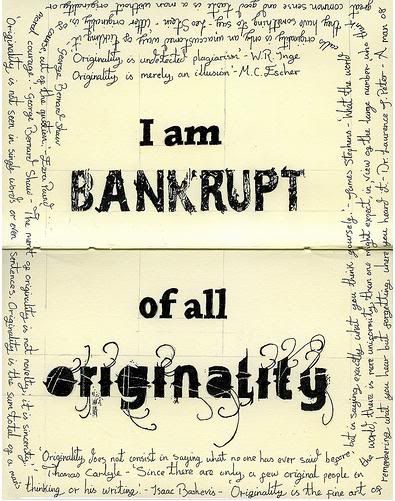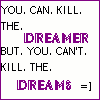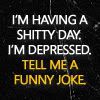Shutter Island (film)
Wednesday, May 19, 2010
Note: If you haven't seen the movie yet, do not read this entry. Don't tell me I didn't warn you.
Shutter Island is a film directed by Martin Scorsese with Leonardo DiCaprio as the lead actor. Of course, one would expect it to be good. It is The Scorsese-DiCaprio tandem after all.
The film was good and... Oh, who am I kidding?
It was a hell of an awesome film.
When I found out that it was an adaptation of Dennis Lehane's novel which was also entitled Shutter Island, I was beyond overwhelmed.
I mean, c'mon, it was The Dennis Lehane's book turned to a film. A Scorsese film, mind you.
Overwhelming.
Actually, even without knowing these names [though I doubt anyone would fail to recognize Leo DiCaprio], you watch the film, you get shaken right down to your bones.
Again, overwhelming.
I wouldn't even try to put some sort of a synopsis here since I assume that, whoever you could possibly be, you've already seen the film.
If you haven't, then that must mean either of two things: your eyesight's bad enough that you hadn't read the note at the start of this entry or you're too stubborn for your own sake that you refuse to not read this entry even though you haven't seen the film yet.
If it's the latter, then I'm sorry my dear reader but I am not going to put in a synopsis here just for you.
Google it or something. Or if you have the time, just watch it. It'll be worth it.
People have told me that I ought to watch it twice. I agree.
All the confusion and complexity that would leave you tugging at your hair and thinking what's real and what's not, it was all deliberately done.
You weren't supposed to get it. Not right away. Not until you're well past three quarters of the story, which by the way, would already be too late for you to notice all those blatant clues and foreshadowing that were present all throughout the film.
The book was designed with that intention in mind. But, of course, it was The Dennis Lehane. You can't expect anything less.
The genius of Martin Scorsese was that he managed to pull it off. Very few films can be considered at par with the original novels. Shutter Island is one of them.
Just on a sidenote, I haven't read the book yet but a friend, who is a literature geek as well, finds it "disturbingly awesome" and I am inclined to trust her words. Plus, it is Dennis Lehane's novel.
I really would have to get my hands on a copy of that book soon.
Back to the topic...
You recall how the movie started? I'm assuming you do.
Now, see this: two federal marshalls teamed up for a mission to a "federal mental facility for the criminally insane" just happened to meet each other aboard a ferry when they're almost near their destination. They seem to have never met before. You'd think that they would have been given a debriefing of some sort beforehand, but no, they were there almost already on the docks of Shutter Island.
How does that sound to you?
You know that something was amiss, but since you're all in this ride together with Teddy, you just charge it on Hollywood trying to play it mysterious. You might have forgotten that it was Scorsese who directed the film. Whatever it was, you go right along with it.
You recall when they reached the facility and they were supposed to give up their firearms? Chuck, Teddy's partner, also known now as the MIA Dr. Sheehan, fumbled in removing his gun holster. Why would he fumble in removing his gun holster anyway?
He is a Federal Marshall. He should be used to it.
Now, when you first watch the film, you may let it pass as some sort of a character quirk for Chuck. You know, something that would allow the Chuck character to be in-character when he starts fumbling his way during a full swing action that would, most probably, get them in deep shit. Allow me to say that this is what I thought it was.
When you reach the three-quarter mark of the film however, that proverbial lightbulb on top of your head would just light up in all its blinding glory and you're going to be asking yourself how come I didn't notice that before...?
Again, that's the genius of it all.
There are more foreshadowing and blatant clues all throughout the film but since the viewers weren't supposed to get it right then, no one did. Well, except for those who have already read the book, most probably.
This is why I agree that one has to watch this film twice.
The first viewing would be disturbing and entertaining and just downright overwhelming... but you just didn't have enough to go deep into it. The second viewing would provide that.
Past the third-quarter mark, the entire charade was revealed to Teddy, and consequently, to us. He is the mysterious 67th patient of Shutter Island. He is Laeddis and he killed his wife who has drowned their three children that one fateful day beside the lake.
It may be said that murder has no justifications but I've always believed that morality is in shades of gray. Personally, I say that killing his wife is justified. She was insane and she drowned their kids in cold blood and she was begging him to just let her go.
Teddy's inner demon wasn't Dolores' death per se but the idea that it all had to happen. Add in all his warshock and trauma and you get someone with a really damaged psyche.
I just can't help but put this in. You recall that military man who botched his own suicide? Teddy took the gun away from his reach. That would require a firm and twisted sense of justice.
That part was just salient to me. That man was supposed to shoot himself in the temple but he botched it. You could just imagine the pain he was in.
The word "euthanasia" crossed my mind but realization that the man, most probably, has been doing inhuman things to the slaves in the Dachau death camp rendered the word not appropriate for the situation.
It's in shades of gray, I've always believed.
Come to think of it, George Noyce already told Teddy the reality of it all. When they talked inside ward C, Noyce said that it was him who had beaten his face to a bloody pulp. Noyce said that Chuck is not what he seems to be and that he should let Dolores go and that they're going to cut his brain and that what he believes to be real is not real...
Noyce wasn't actually subtle about his announcement but did anyone get what he was really trying to say during the first viewing?
He told Teddy that this is not real. He told Teddy the secret of Shutter Island. He revealed it all in one breath but to Teddy [and the viewers] this is just confirmation that this is an elaborate ploy to convince himthat he is, in fact, insane. Plus, Chuck is part of the ploy.
Yes, the what-if-this-is-all-just-Teddy's-imagination may have crossed your mind at one point but were you ever absolutely certain on what you were thinking?
You see, you're all going along with Teddy in this ride. It was his perspective. His point of view. His decisions. His story. It was his ride all along. Yes, we were with him all along.
That was why Dr. Cawley's revelation in the lighthouse came to be such a shock. That time, it was Dr. Cawley's perspective. Dr. Cawley's point of view. Dr. Cawley's decisions.
You get to realize that Teddy was not the one driving the vehicle all along.
Now, what about the ending of the film, you would ask.
Teddy was sitting there on the steps and Chuck-slash-Dr. Sheehan came up to him and Teddy was all in his I-am-a-Federal-Marshall-and-we-have-to-get-out-of-here mode. That time, it seemed as if he had relapsed but was he truly insane or was he deliberately acting to be insane just so they would finally lobotomize him because he still couldn't accept the truth?
Just when you thought you had it nailed, they hurl something at you...
"Is it better to live as a monster or die as a good man?"
There are lots of interpretations for that final line. Some say that Teddy was not really insane and that Dr. Cawley and the rest of his crew just want to convince him otherwise and that he chose to die as a good man rather than live in a world where everyone's acting as if he is a monster. Others say that Teddy was, in fact, insane and was cured but he still couldn't accept reality so he fakes relapse just so they'll finally cut off his brain, or maybe, kill him. Some even say that Teddy, yes, was insane and they weren't able to cure him hence the relapse. His last line won't make sense though, if that were the case.
It is a Dennis Lehane novel. It is a Martin Scorsese film. It's open to interpretation. Take your pick. It doesn't matter because in the end, there are no truths, only perceptions.
Y Y Y
Bankrupt of Originality
Saturday, May 15, 2010
It has been way too long since I last posted something in this blog. It has been an entire sem already. No, this blog is not, in any way, abandoned. I just took an unexpected halfyear hiatus. But take a look, I'm here now.
Anyway, moving on to what I was supposed to post after that long hiatus...

Plagiarism.
It is a form of cowardice. It's as if you're trying to hide your own incompetence behind the works of other people. You claim as it your own, trying to delude yourself (and other people, for that matter) that you've created it. You feed on other people's intellectual property.
The compliments you receive are nothing but empty words.
I so detest plagiarists. Especially those who plagiarize fiction.
I mean, c'mon, fiction is a form of expression and you just can't copy someone else's form of expression.
Not only it's illegal. It's also a form of self-mockery.
What, you don't have the skills and imagination to write one for yourself?
Ooh yes. It is a form of self-mockery.
You may have taken down the plagiarized work from your site but the fact that you plagiarized still remains. You know who you are. And you know what you are. A plagiarist. A fraud.
What the original writer of that work wants is acknowledgment. All you had to do was to put a little byline or even a parenthetical citation to acknowledge who wrote the work. But no, when people asked you if you wrote that thing, you just had to say yes. When people complimented the work, you just had to say that you write these kinda things when "inspired, driven, and motivated."
Sheesh. Inspired, driven and motivated to what? To plagiarize, most probably.
Don't you feel pathetic?
I have said this before but I really think I ought to say it again.
Plagiarism is illegal.
The original work was submitted to an esteemed UP professor, mind you. The said professor could testify that it was one of her former Creative Writing students who wrote that work. Lots of people could testify against you. Me being one of them. I have read the original draft.
Oh, and just in case you're thinking that you weren't exactly plagiarizing because you paraphrased what was originally written, I have to say that plagiarism is not only copying someone else's work verbatim. When you closely imitate someone else's work by changing a few words here and there, that is still plagiarism. You cannot say otherwise.
Considering the fact that you're a member of a writing org in DLSU, this is really degrading. Shameful, even more so.
You cannot say that you are "more of an idea kind of guy". Everyone has ideas. All the time. What makes writers different from everyone else is the fact that they can actually put their ideas into words and create something tangible out of it.
Writers are called writers for a reason.
You cannot say that you are "not much into writing" either. That's just like a swordsman saying he has lots of ideas on how to become a damned good swordsman but he's just not into using swords...
*insert eye-rolling gesture here*
Not to mention that the swordsman really wants people to praise him so he just claims the fame of a REAL swordsman for himself...
Oh. Did that hit too close to home?
I'm sorry.
Not.
Here's a copy of the original work, by the way.
--------------------------------------------------------------------
BY: MIGUEL RICO SUBOSA
THINGS WITH A FUTILE BEAUTY
The reddest rose atop the tomb of a dead beloved.
A book you love all too well that you placed it far up some shelves -- its pages virgin, not one dog-eared. And it even still smells of plastic unwrapped.
The ever-changing moon, blessed with a borrowed luster yet accursed of appearing every night.
A melody sang but never heard.A grand idea left unspoken. Or that grand idea spoken in too many words.
INVIGORATING THINGS
Moss along the bark of a wilted tree in wintertime.
The returning caress of a winter breeze on Indian summer.
A light that flickers from a distance while one is alone and afloat the indigo vastness of an ocean at night.
The sidden silence of a mother to welcome the first cries of her infant. She chooses to sleep and quiet her cries of pain so that the little world of the delivery room hears nothing but her newborn child's cries. It is her hero's welcome for one she has long been awaiting.
A sour candy that stings the tongue -- STING! -- when one is half-asleep.Sex between lovers, though one or the other is infertile.
--------------------------------------------------------------------------
"Things with a futile beauty" and you changed it to "Beauty in Vain"...
"A reddest rose atop the tomb of a dead beloved" and you changed it to "A crimson rose atop a lover's gravestone"...
Y'see, that's plagiarism. As a self-proclaimed writer, you should know that it is the lowest of all the lowest things that you could have done.
How much more pathetic a writer could you be?
My books need no one to accuse or judge you: the page which is yours stands up against you and says, "You are a thief."-Marcus Valerius Martial
Anyway, moving on to what I was supposed to post after that long hiatus...

Plagiarism.
It is a form of cowardice. It's as if you're trying to hide your own incompetence behind the works of other people. You claim as it your own, trying to delude yourself (and other people, for that matter) that you've created it. You feed on other people's intellectual property.
The compliments you receive are nothing but empty words.
I so detest plagiarists. Especially those who plagiarize fiction.
I mean, c'mon, fiction is a form of expression and you just can't copy someone else's form of expression.
Not only it's illegal. It's also a form of self-mockery.
What, you don't have the skills and imagination to write one for yourself?
Ooh yes. It is a form of self-mockery.
You may have taken down the plagiarized work from your site but the fact that you plagiarized still remains. You know who you are. And you know what you are. A plagiarist. A fraud.
What the original writer of that work wants is acknowledgment. All you had to do was to put a little byline or even a parenthetical citation to acknowledge who wrote the work. But no, when people asked you if you wrote that thing, you just had to say yes. When people complimented the work, you just had to say that you write these kinda things when "inspired, driven, and motivated."
Sheesh. Inspired, driven and motivated to what? To plagiarize, most probably.
Don't you feel pathetic?
I have said this before but I really think I ought to say it again.
Plagiarism is illegal.
The original work was submitted to an esteemed UP professor, mind you. The said professor could testify that it was one of her former Creative Writing students who wrote that work. Lots of people could testify against you. Me being one of them. I have read the original draft.
Oh, and just in case you're thinking that you weren't exactly plagiarizing because you paraphrased what was originally written, I have to say that plagiarism is not only copying someone else's work verbatim. When you closely imitate someone else's work by changing a few words here and there, that is still plagiarism. You cannot say otherwise.
Considering the fact that you're a member of a writing org in DLSU, this is really degrading. Shameful, even more so.
You cannot say that you are "more of an idea kind of guy". Everyone has ideas. All the time. What makes writers different from everyone else is the fact that they can actually put their ideas into words and create something tangible out of it.
Writers are called writers for a reason.
You cannot say that you are "not much into writing" either. That's just like a swordsman saying he has lots of ideas on how to become a damned good swordsman but he's just not into using swords...
*insert eye-rolling gesture here*
Not to mention that the swordsman really wants people to praise him so he just claims the fame of a REAL swordsman for himself...
Oh. Did that hit too close to home?
I'm sorry.
Here's a copy of the original work, by the way.
--------------------------------------------------------------------
BY: MIGUEL RICO SUBOSA
THINGS WITH A FUTILE BEAUTY
The reddest rose atop the tomb of a dead beloved.
A book you love all too well that you placed it far up some shelves -- its pages virgin, not one dog-eared. And it even still smells of plastic unwrapped.
The ever-changing moon, blessed with a borrowed luster yet accursed of appearing every night.
A melody sang but never heard.A grand idea left unspoken. Or that grand idea spoken in too many words.
INVIGORATING THINGS
Moss along the bark of a wilted tree in wintertime.
The returning caress of a winter breeze on Indian summer.
A light that flickers from a distance while one is alone and afloat the indigo vastness of an ocean at night.
The sidden silence of a mother to welcome the first cries of her infant. She chooses to sleep and quiet her cries of pain so that the little world of the delivery room hears nothing but her newborn child's cries. It is her hero's welcome for one she has long been awaiting.
A sour candy that stings the tongue -- STING! -- when one is half-asleep.Sex between lovers, though one or the other is infertile.
--------------------------------------------------------------------------
"Things with a futile beauty" and you changed it to "Beauty in Vain"...
"A reddest rose atop the tomb of a dead beloved" and you changed it to "A crimson rose atop a lover's gravestone"...
Y'see, that's plagiarism. As a self-proclaimed writer, you should know that it is the lowest of all the lowest things that you could have done.
How much more pathetic a writer could you be?
My books need no one to accuse or judge you: the page which is yours stands up against you and says, "You are a thief."-Marcus Valerius Martial
Y Y Y


















































